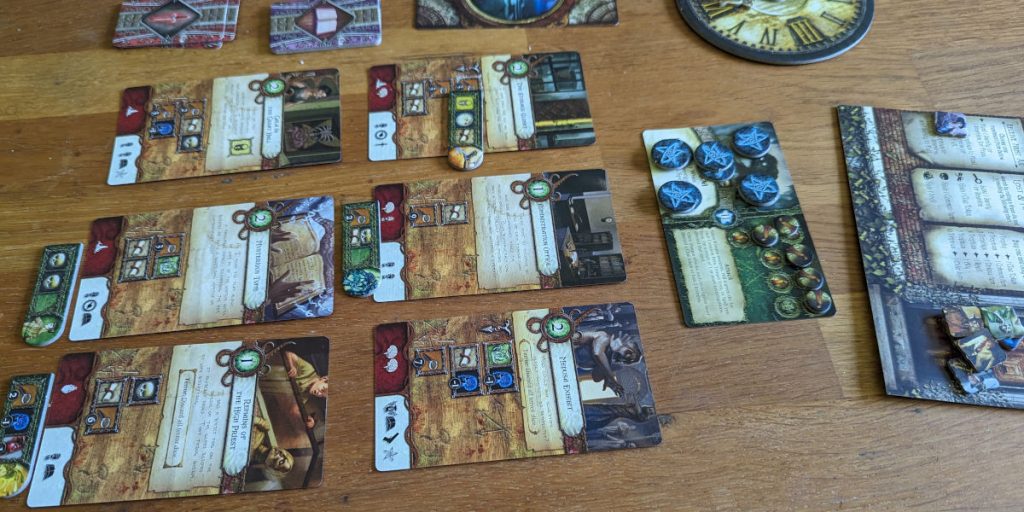Elder Sign

We had friends over for boardgaming at the weekend, and since there were seven of us it limited our choice of games somewhat. There was Tsuro, which is always a good choice, but it’s not much more than a quick game. For the longer game our options came down to Elder Sign, Eldritch Horror, Arkham Horror or Formula D. Arkham Horror we’ve played recently, and is always fiddly to setup. Eldritch Horror was right at the bottom of the pile so I hadn’t got it out. There was little interest in Formula D, so that left Elder Signs.
Elder Sign involved some reading of the rules, but otherwise setup wasn’t too bad. We each took a random character, and set off to save the world (it’s a cooperative game). Two of us have played it a few times before, but this was the first time I think that we’ve had more than two players.
The characters are similar to those in the other Fantasy Flight Call of Cthulhu themed games, so the artwork for them is familiar. There are six quests out on the board, each of which has a number of tasks associated with them – normally two or three. You assign your character to a quest, and then try to complete the tasks.
Task completion involves rolling dice. You get six basic (green) dice, with some items giving you an extra red or yellow die. Each has symbols on it – a scroll, skull, tentacles or a number of investigation points. You roll the dice and try and match the symbols, and that’s basically it.
A task might need 3 investigation points plus a tentacle, or two scrolls, or some other combination. You roll, assign the matching dice to the task to complete it, then roll again with the remaining dice to try the next task. If you fail, you drop a die and roll again to retry. Some tasks require you to pay sanity or health in order to complete them.
If you complete the who quest, it is removed and you gain bonuses (elder signs, clues, items) and penalties (normally sanity or health loss, sometimes an increment of the doom track). You then replace it with another quest. Partially completing a quest doesn’t help, unless it has a monster in which case the monster stays dead.
The aim of the game is to gain enough elder signs to stop the Big Bad (in our case, Ithaqua) from waking up. If the doom track gets to the end first, then it wakes and you have to fight it.
There is also a clock, which clicks on 3 hours after each player’s turn. At the end of each day, you draw a new card which may affect how things play.
In the end, the game took about two hours and we stopped Ithaqua from waking up quite easily. For a Call of Cthulhu game it actually felt really easy. It may be that having seven players meant we had enough resources in the form of allies and items to be at an advantage. My memory of playing it with just two players is that it was actually quite hard.
Since every character rolls the same dice, there’s not much difference between the characters. They each have slightly different sanity and health, but that really didn’t come into it much. They start with different items or allies (I had Ashcan Pete, who begins with a dog you can sacrifice to avoid the bad effects of failing a quest), but it’s not a huge difference. Games like Arkham Horror make the characters feel a bit more important due to having a bigger difference in their skills.
There also didn’t seem to be a lot of skill involved. There’s some importance to selecting which quest to go for, but for the most part it was fairly obvious. There can be a little bit of cooperation, but again there’s not much. Compared to Arkham Horror, or Mansions of Madness, it’s quite simple and somewhat bland. It’s not a bad game, but it’s not a great game either. It kept us amused for a couple of hours, and allowed us to eat and chat whilst we played.
I still would like to give Formula D another go at some point though.